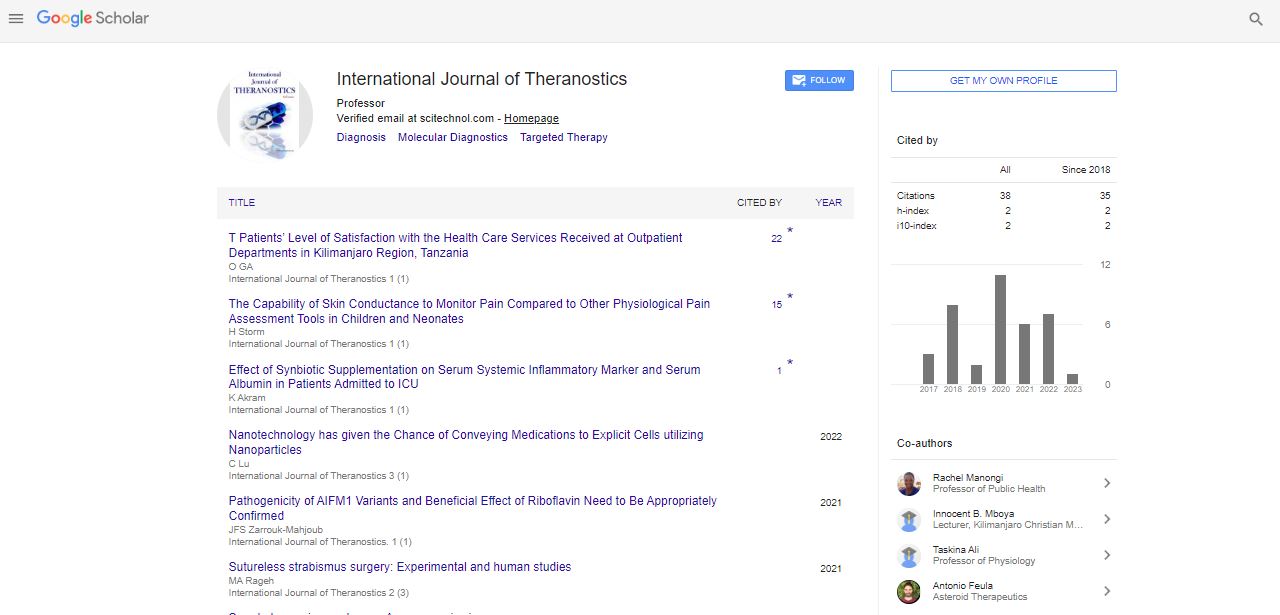Commentary, Ijt Vol: 12 Issue: 3
The Significance of RBC Magnesium as a Biomarker for Health
Patrice Dorota*
1Department of Immunology & Infectious Diseases, Harvard T.H. Chan School of Public Health, Boston, USA
*Corresponding Author: Patrice Dorota,
Department of Immunology & Infectious
Diseases, Harvard T.H. Chan School of Public Health, Boston, USA
E-mail: doratap33@hsph.harvard.edu
Received date: 30 August, 2023, Manuscript No. IJT-23-117649;
Editor assigned date: 01 September, 2023, PreQC No. IJT-23-117649 (PQ);
Reviewed date: 15 September, 2023, QC No. IJT-23-117649;
Revised date: 22 September, 2023, Manuscript No. IJT-23-117649 (R);
Published date: 02 October, 2023, DOI: 10.4172/IJT.1000140
Citation: Dorota P (2023) The Significance of RBC Magnesium as a Biomarker for Health. Int J Theranostic 12:3.
Abstract
Magnesium is an essential mineral that plays a crucial role in various physiological functions within the human body. While most people are aware of its significance in muscle and nerve function, few are familiar with the concept of RBC (Red Blood Cell) magnesium as a biomarker. RBC magnesium levels have gained attention in recent years as an important indicator of overall health and wellness.
Description
Magnesium is an essential mineral that plays a crucial role in various physiological functions within the human body. While most people are aware of its significance in muscle and nerve function, few are familiar with the concept of RBC (Red Blood Cell) magnesium as a biomarker. RBC magnesium levels have gained attention in recent years as an important indicator of overall health and wellness. This article delves into the significance of RBC magnesium as a biomarker and how it can provide valuable insights into a person's health.
The importance of magnesium
Magnesium is the fourth most abundant mineral in the human body and is involved in over 300 biochemical reactions. It plays a vital role in various processes, including energy production, muscle and nerve function, bone health, and DNA synthesis. Magnesium also acts as a cofactor for enzymes responsible for the metabolism of carbohydrates, protein, and fats. Red blood cells, which transport oxygen throughout the body, are increasingly recognized as a valuable source of information about an individual's health. RBC magnesium refers to the concentration of magnesium within these cells and is measured as a biomarker. The measurement is usually expressed in milligrams of magnesium per deciliter (mg/dL) of red blood cells. RBC magnesium levels reflect magnesium status within the body over a more extended period compared to the standard serum magnesium test. This makes it a valuable marker for assessing an individual's overall magnesium status, as it is less influenced by daily fluctuations in magnesium intake and excretion.
Why RBC magnesium matters
RBC magnesium levels provide a more accurate representation of an individual's magnesium status compared to serum magnesium levels. Serum levels can fluctuate throughout the day and may not reflect the body's true magnesium stores accurately. RBC magnesium levels are indicative of the mineral's status over a more extended period. This is particularly important because chronic magnesium deficiency can lead to various health issues, including cardiovascular diseases, diabetes, and osteoporosis. Research has shown that low RBC magnesium levels may be associated with an increased risk of various health conditions, including hypertension, coronary artery disease, and metabolic syndrome. Monitoring RBC magnesium can assist in early disease risk assessment. RBC magnesium can also help evaluate an individual's nutritional intake of magnesium. A consistently low RBC magnesium level may suggest inadequate dietary magnesium intake, emphasizing the need for dietary adjustments or supplementation. By monitoring RBC magnesium, healthcare professionals can provide more tailored recommendations for magnesium supplementation or dietary changes, promoting better overall health and wellness.
How to measure RBC magnesium
Measuring RBC magnesium levels is a straightforward process and can be done through a blood test. Healthcare professionals typically draw a blood sample, and the RBC magnesium concentration is determined through laboratory analysis. Interpretation of the results should be performed by a qualified healthcare provider who can assess the findings in the context of an individual's overall health.
Conclusion
RBC magnesium is a valuable biomarker that offers insights into an individual's long-term magnesium status and its implications for health and wellness. It provides a more accurate and stable representation of magnesium levels within the body compared to serum magnesium, making it an essential tool for assessing disease risk and nutritional adequacy. Monitoring RBC magnesium levels can aid in personalized healthcare recommendations and promote better overall health by addressing potential magnesium deficiencies. As we continue to uncover the significance of this essential mineral, the role of RBC magnesium in healthcare is likely to become even more prominent.
 Spanish
Spanish  Chinese
Chinese  Russian
Russian  German
German  French
French  Japanese
Japanese  Portuguese
Portuguese  Hindi
Hindi 